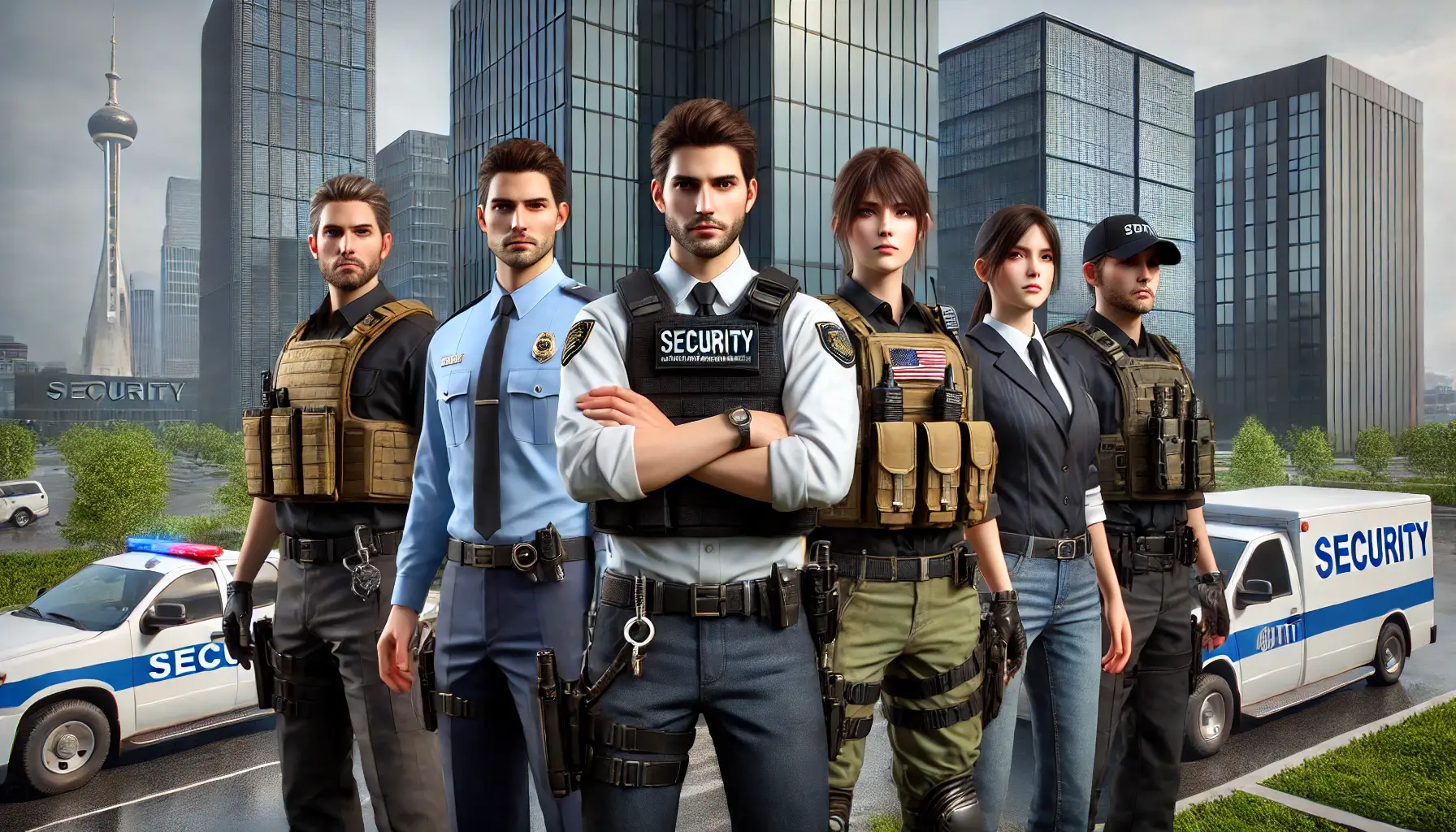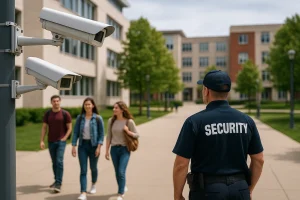Exploring The Types Of Security Guards And Their Roles: Understanding The Diversity In The Industry
Protecting people, property, and data has never been more crucial. Therefore understanding the diverse roles and responsibilities within the security industry will help you find your fit in this indispensable and rapidly growing field. To start, the various types of security guards are generally categorized into 3 main guard types- based on their employment source. […]
By Catherine Shannon
September 10, 2024

Protecting people, property, and data has never been more crucial. Therefore understanding the diverse roles and responsibilities within the security industry will help you find your fit in this indispensable and rapidly growing field. To start, the various types of security guards are generally categorized into 3 main guard types- based on their employment source.
Understanding The 3 Key Types Of Security Guards
- PRIVATE SECURITY GUARDS
- This is the most common public perception of security guards- trained personnel hired by private security agencies. They perform numerous roles, from bodyguard to mobile patrollers, surveillance operators, warehouse security, event security/crowd control/access control, etc. Private security guards can be armed or unarmed, canine handlers, or specifically licensed for driving specialized armored vehicles, for instance. There are myriad variations of private security personnel subject to client needs.
- IN-HOUSE (PROPRIETARY) GUARDS
- These security personnel are directly hired and trained by a company’s security department and are part of that company’s internal security team. These companies can be hospitals, cruise ships, banks, hotels, nightclubs, or museums. Like private security guards, in-house guard duties can also include mobile patrols, surveillance, armed or unarmed duty, or access control. Another example of proprietary guards are courtesy officers– usually directly employed by a property management company to provide an added layer of security to their housing.
- GOVERNMENT GUARDS
- These can be security guards hired through government contracts for courthouses, military command centers, and government facilities. Private military contractors (PMC’s) or security contractors fit into this category. They work for the government but are not considered direct government employees- often used in military settings to protect convoys, provide logistical and intelligence assistance, and even aid in combat support. There are also direct government security personnel that are direct hires for government entities- e.g. the U.S. Secret Service Uniformed division or the Pentagon Force Protection Agency. Another example would be federal air marshals (FAMs)- government employees of the Transportation Security Administration (TSA) that guard air, train, ferry, or other transportation facilities.
What Are The Various Ranks In Security Guard Positions?
There are assorted ranks within security personnel that can be achieved as a guard’s career and experience progresses.
- Security Guard/Security Officer: This is an entry-level rank, responsible for basic patrolling, surveillance, and reporting. Security guard and security officer are often used interchangeably, but an officer can be tasked with a more supervisory managerial role.
- Lead Security Guard/Shift Supervisor: This supervisory role is in charge of managing a team of security guards, ensuring tasks are carried out efficiently during a particular shift.
- Security Manager: A security manager oversees the security operations at a specific site or multiple sites.
- Director of Security: The director of security sets all security policies, procedures, and strategies for a large establishment or organization.
- Chief Security Officer (CSO): The CSO is the highest-ranking officer in large corporations, responsible for the entire security strategy of the organization, often including cybersecurity.
What Are Roles Demanding Specialized Training?
Basic roles and responsibilities of any security guard can involve patrolling, monitoring surveillance, access control, incident response, observation and reporting, customer service, deterrence to crime, loss prevention, emergency preparedness, enforcement of rules and regulations, and conflict resolution to maintain a safe environment. There are certain roles that require additional expertise and specialized training:
- Event Security Specialist: This role calls for training focused on crowd management and control, emergency response, basic first aid, access control/screening techniques (including metal detectors/bag searches), evacuation strategies, medical emergency events, and credential verification (e.g. validating event passes or tickets).
- Executive Protection Specialist: This specialist is a bodyguard that ensures the safety and security of VIPs and high-profile individuals such as executives, celebrities, and politicians. They need training in threat assessment techniques and how to best mitigate risks and vulnerabilities. Weapons training, close protection techniques of personal protection, close quarters combat and evasive maneuvers are essential. Executive protection specialists concentrate on close personal protection, while the related roles of private security contractors (PSCs) have a greater range of responsibilities in broader security operations.
- Surveillance Operator: This role necessitates technical skills to operate the many types of security cameras, including pan, tilt, zoom (PTZ), fixed, and network cameras, along with digital video recorders (DVRs), network video recorders (NVRs). Techniques for monitoring live video feeds and reviewing footage, with network infrastructure relating to IP-based systems, and software proficiency are also vital.
- Armed Security Guard: This security role demands specialized tactics, training in firearms, and defensive and use-of-force protocols. These security guards must also be proficient in the legal aspects of carrying and using weapons. They need armed guard licenses to prove their current training. Other additional licenses would also include a canine handler license for guards working with security dogs, or a specialized vehicle license for guards driving armored vehicles or other specialized transport.
- Cybersecurity Specialist: These specialists train in cybersecurity principles, threat detection, network security and incident response in order to protect digital assets and networks from cyber attacks. Specifically, with AI transforming video surveillance to visual intelligence, AI’s growing impacts on cybersecurity are also a growing mega-trend demanding many more trained surveillance operators.
- Loss Prevention Specialist: With retail shrinkage costing retailers billions annually, loss prevention specialists are in high demand. They get specialized training to apply techniques in prevention, surveillance for suspicious activities, and establishment of indispensable effective security protocols. Loss prevention specialists address both internal and external threats to a retail environment.
This comprehensive overview of guard types, ranks, and roles, is an aid in developing your security guard career in the burgeoning and dynamic security industry.
Related Posts
Regulations
Security has always been a paramount concern for civilizations, be it in the form of fortified castles in the Middle Ages or surveillance cameras in today’s digital age. The methods and means have evolved, and nowhere is this evolution more evident than in security patrol services. In the modern era, as threats become more multifaceted […]
By David Kerolles
August 27, 2023
Startup
The job of a security guard can be described in many ways- as crucial for safety, providing proactive security, being a first line of defense, offering assistive customer service, inspiring public confidence, and maintaining law and order for clients. But TRAINED RESPONSE TO EMERGENCIES is what sets security guards apart. Using the correct emergency response […]
By David Kerolles
July 1, 2024
Comparisons
For those aspiring to build a solid foundation and climb the ladder in the security industry, obtaining a guard training certificate and understanding the necessary training and licenses is critical. The process, however, is more than just obtaining a certificate. It requires continuous learning and training- and often, multiple licenses. Here is a comprehensive look […]
By David Kerolles
January 15, 2025





